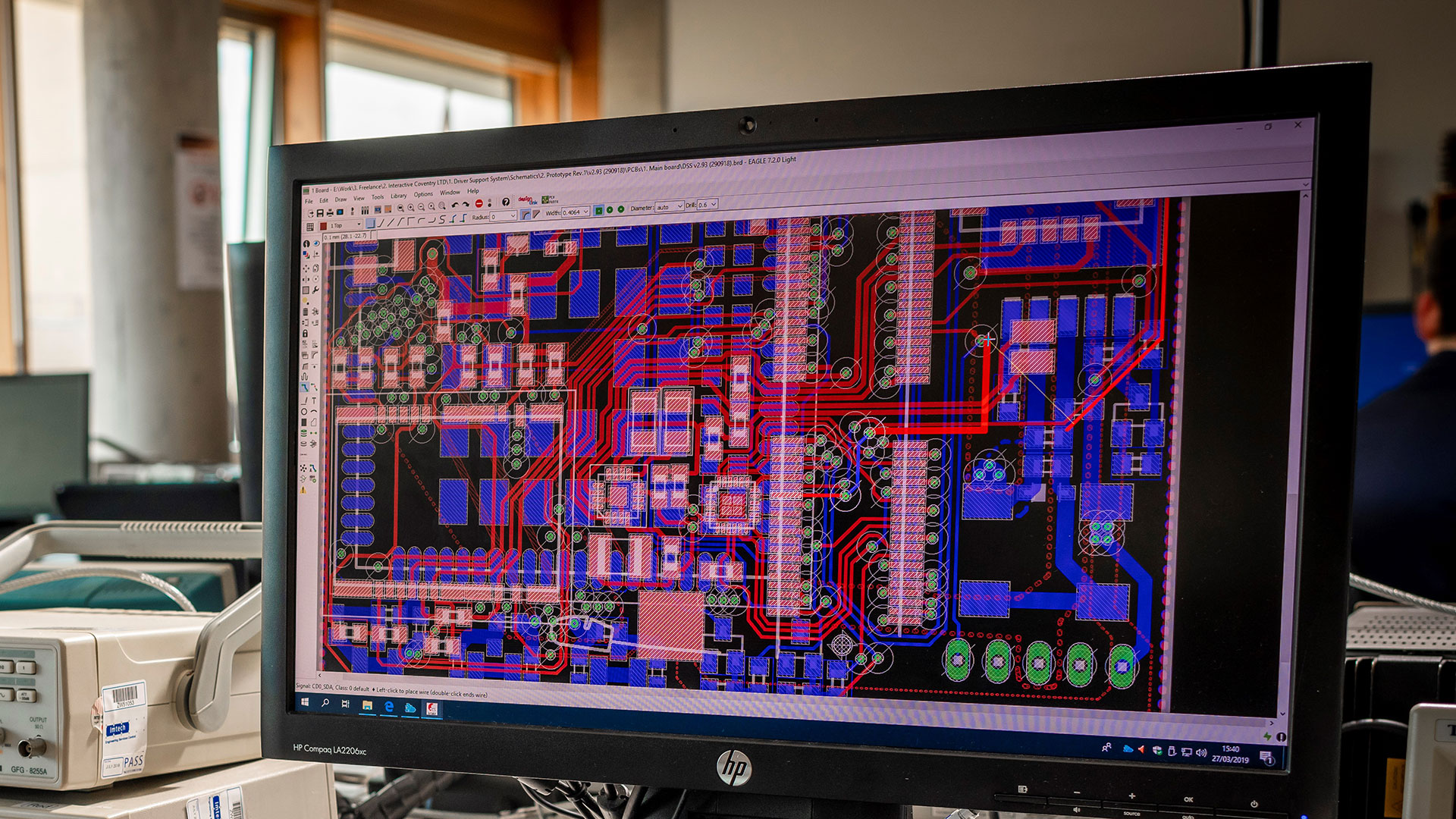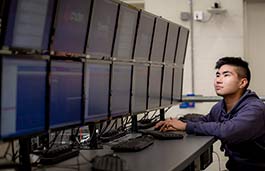Search
Electrical and Electronic Engineering MEng/BEng (Hons)
Study level: Undergraduate
This course delivers strong academic content conveyed with a factual focus, with the aim of preparing you to take on the challenges present in the field of electrical and electronic engineering (EEE).
Course features
Course option
Year of entry
Location
Coventry University (Coventry)
Study mode
Full-time
Sandwich
Duration
BEng:3 years full-time4 years sandwich
MEng:4 years full-time5 years sandwich
UCAS codes
H600 / H610
Start date
September 2025
The information on this page is for 2024-25 entry and should be used as guidance for 2025-26 entry. Please keep checking back on this course page to see our latest updates.
Course overview
EEE engineers are hugely involved in the expanding world of electrical vehicle design and make enormous contributions in terms of technological innovation and advancement in a range of other specialised fields; for example, aerospace systems, civil engineering in projects such as high-speed train design and development.
- The course aims to develop and implement a multiplicity of systems associated with electrical and electronic engineering. On the electrical side, you could be involved in the generation, transmission and control of electrical energy or machine design and the implementation of power drive systems, which links to power electronic engineering.
- From the outset, we aim to place an emphasis on innovation, design, and development to enable you the opportunity to enrich your technical skills in the field of electrification of vehicle and control systems.
- We further aim to develop your intellectual and independent thinking necessary to participate in contemporary projects and to peruse further studies and research in the field of electrical engineering.
Joint Top Modern University for Career Prospects
Guardian University Guide 2021 and 20225 QS Stars for Teaching and Facilities
QS Stars University RatingsTop 5 UK Student City (Coventry)
QS Best Student Cities Index 2023Why you should study this course
- Well-equipped dedicated electronics laboratory to build electronic prototype4.
- Modern electrical labs to explore high voltage systems4.
- Placement opportunities within UK industries2.
- Opportunities to gain international experience through field trips and group-based final year project2.
What you'll study
We regularly review our course content, to make it relevant and current for the benefit of our students. For these reasons, course modules may be updated.
How you'll learn
Learning will be facilitated through a variety of methods which may include lectures, seminars, lab, workshops, online activities and group work. Students are expected to engage in both class and online activities and discussions. The course also requires students to participate in additional guided reading and self-directed study to reinforce the learning gained from timetabled sessions.
A portion of contact time will be dedicated to course support sessions. The course support sessions are weekly, timetabled sessions where you can explore areas of the course you find challenging or get support with personal projects and employability efforts.
Teaching contact hours
We understand that everyone learns differently, so each of our courses will consist of structured teaching sessions, which can include:
- On campus lectures, seminars and workshops
- Group work
- Self-directed learning
- Work placement opportunities2.
Part of university life is undertaking self-directed learning. During a typical week you will have time that allows you to work independently to apply the skills and knowledge you have learnt in taught or facilitated sessions to your projects or assignment briefs. This self-directed learning allows you to use your research skills, consolidate your knowledge or undertake collaborative group work.
The contact hours may be made up of a combination of face-to-face teaching, individual and group tutorials, and online classes and tutorials.
As an innovative and enterprising institution, the University may seek to utilise emerging technologies within the student experience. For all courses (whether on-campus, blended, or distance learning), the University may deliver certain contact hours and assessments via online technologies and methods.
Since COVID-19, we have delivered our courses in a variety of forms, in line with public authority guidance, decisions, or orders and we will continue to adapt our delivery as appropriate. Whether on campus or online, our key priority is staff and student safety.
Assessment
This course will be assessed using a variety of methods which will vary depending upon the module.:
Assessment methods include:
- Formal examinations
- Phase tests
- Essays
- Group work
- Presentations
- Reports
- Projects
- Coursework
- Exams
- Individual assignments
- Laboratories
- Posters
The Coventry University Group assessment strategy ensures that our courses are fairly assessed and allows us to monitor student progression towards achieving the intended learning outcomes.
International experience opportunities
Electrical and Electronic engineering is a global discipline, so we encourage a global perspective throughout our teaching.
If you opt for a sandwich year, you have the opportunity to spend a period abroad2 for part of your studies; we have current student exchange links with universities in approximately 20 countries around the world and we will support you in trying to find a work placement abroad. We have had past faculty students secure international placements in, for example, Austria and France.
Entry requirements
Typical offer for 2025/26 entry.
Not got the required grades? We offer this degree with an integrated foundation year.
Fees and funding
| Student | Full-time | Part-time |
|---|---|---|
| UK, Ireland*, Channel Islands or Isle of Man | 2025/26 fees TBC 2024/25 fees - £9,250 per year |
Not available |
| EU | 2025/26 fees TBC 2024/25 fees - £9,250 per year with EU Support Bursary** 2025/26 fees TBC 2024/25 fees - £19,850 per year without EU Support Bursary** |
Not available |
| International | 2025/26 fees TBC 2024/25 fees - £19,850 per year |
Not available |
If you choose to study this course with a professional placement2 or study abroad year, you will need to pay a tuition fee3 of £1,250 to cover your academic support throughout your placement year.
For advice and guidance on tuition fees and student loans visit our Undergraduate Finance page and see the university’s Tuition Fee and Refund Terms and Conditions.
The university will charge the tuition fees that are stated in the above table for the first Academic Year of study. The university will review tuition fees each year. For UK (home) students, if Parliament permits an increase in tuition fees, the university may increase fees for each subsequent year of study in line with any such changes. Note that any increase is expected to be in line with inflation.
For international students, we may increase fees each year, but such increases will be no more than 5% above inflation. If you defer your course start date or have to extend your studies beyond the normal duration of the course (e.g. to repeat a year or resit examinations) the university reserves the right to charge you fees at a higher rate and/or in accordance with any legislative changes during the additional period of study.
We offer a range of International scholarships to students all over the world. For more information, visit our International Scholarships page.
Tuition fees cover the cost of your teaching, assessments, facilities and support services. There may be additional costs not covered by this fee such as accommodation and living costs, recommended reading books, stationery, printing and re-assessments should you need them.
The following are additional costs not included in the tuition fees:
- Any optional overseas field trips or visits: £400+ per trip.
- Any costs associated with securing, attending or completing a placement (whether in the UK or abroad).
Find out what's included in your tuition costs.
*Irish student fees
The rights of Irish residents to study in the UK are preserved under the Common Travel Area arrangement. If you are an Irish student and meet the residency criteria, you can study in England, pay the same level of tuition fees as English students and utilise the Tuition Fee Loan.
**EU Support Bursary
Following the UK's exit from the European Union, we are offering financial support to all eligible EU students who wish to study an undergraduate or a postgraduate degree with us full-time. This bursary will be used to offset the cost of your tuition fees to bring them in line with that of UK students. Students studying a degree with a foundation year with us are not eligible for the bursary.
Facilities
The School of Future Transport Engineering is based in the Engineering and Computing Building, and the attached Beatrice Shilling Building. Both buildings are high-specification learning environments, which benefit from extensive social learning facilities, well-appointed laboratories, lecturing facilities and classrooms, facilitating our innovative teaching methods across a diverse suite of undergraduate and postgraduate courses4.
- Electrical power and machine laboratory
Provides students with hands-on learning tools and test benches. Supports learning of the properties of electrical generation use, with the aim of training students in the maintenance and running of electrical machines. - Electronics laboratory
Equipped with a range of test and measurement equipment, development boards for embedded electronics and a variety of interface for motor solutions. - Manufacturing facility
This facility is equipped with 3-D printers and PCB manufacturing machines. This also has a separate area for soldering training.
Careers and opportunities
Successful electrical and electronic engineers should be highly trained professionals, and there is likely to continue to be a demand for electrical and electronic engineers with the ability to specify and design electronic engineering solutions for future challenges, such as electric vehicle, renewable energy generation, robot systems and medical diagnostics. Your career options could range from electrical or electronic design through to electronic manufacturing and integrating, providing and maintaining system solutions for a multitude of different industries.
The technical content of this course is regularly reviewed to reflect what is currently important and in-demand in the electrical and electronic engineering industry. We also aim to ensure that the capabilities and skills that the sector regularly asks for are well addressed.
On successful completion, you will have a comprehension of:
- Scientific principles and methodologies relevant to electrical & electronic engineering.
- Mathematical and quantitative methods used in engineering analysis and design.
- Engineering project management including ethics, finance, risk, health and safety, and similar issues.
- The wider multidisciplinary context of engineering, incorporating social, economic, and environmental issues.
On successful completion, you will have expertise in:
- Solving technical and management problems involving uncertainty.
- Design of innovative products and systems employing recognised methodologies.
- Planning and executing research-oriented project work.
- Selecting and apply appropriate components, materials, and manufacturing processes.
- Planning and executing practical work involving experimentation, data collection, prototype construction, testing and specialised instrumentation.
- Use of specialised software tools and information technology equipment.
- Accessing and evaluating information sources including technical literature, standards, and codes of practice.
Where our graduates work
Previous graduates from the course have gone into predominately industry roles in diverse range of industries, for example, JLR, GE and National Grid, Jaguar Land Rover, Siemens, Bosch, Blackberry, IBM, DSTL – Defence Science and Technology Laboratory, Advanced Electronics Company, Ultra Electronics Sonar Systems, PX Group and more. Some choose to progress to further study of an MSc or PhD.
Further study
You can choose to continue your studies at Coventry University with the Electrical and Electronic MSc. You may be entitled to an alumni discount on your fees if you decide to extend your time with us by progressing from undergraduate to postgraduate study.
Graduate Immigration Route visa
Based on current information from the UK Government, international students whose study extends beyond summer 2021 may be eligible for a visa under the UK Government’s Graduate Immigration Route, which will enable students to stay and work, or look for work, in the UK at any skill level for up to two (2) years. Check the most up to date guidance available to check your eligibility and any updates from the UK Government before making an application or enrolment decision.
How to apply
You may also like




